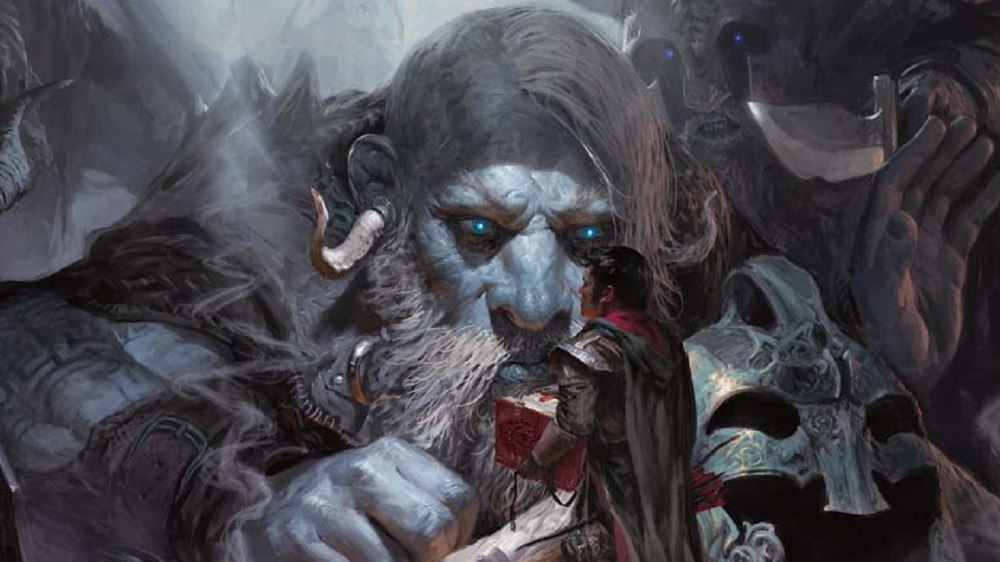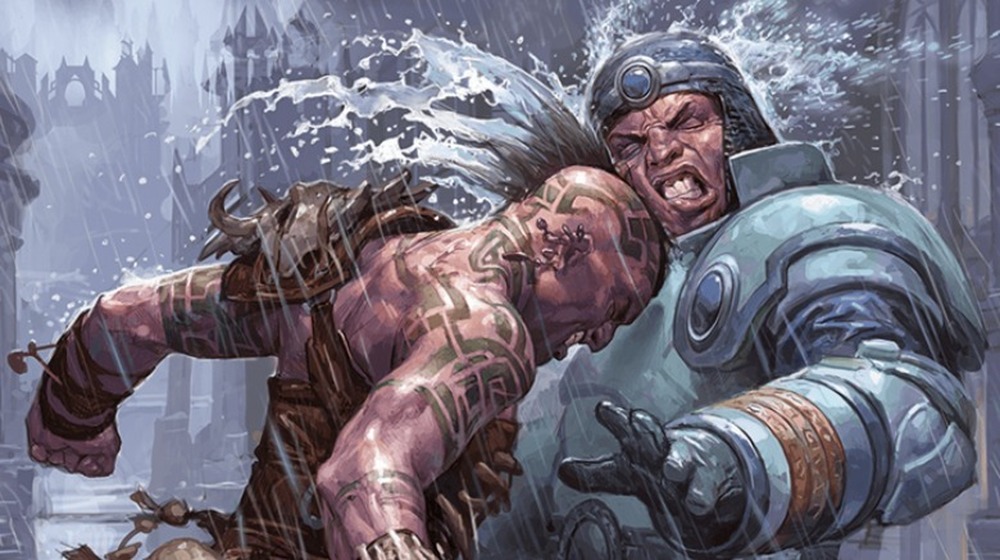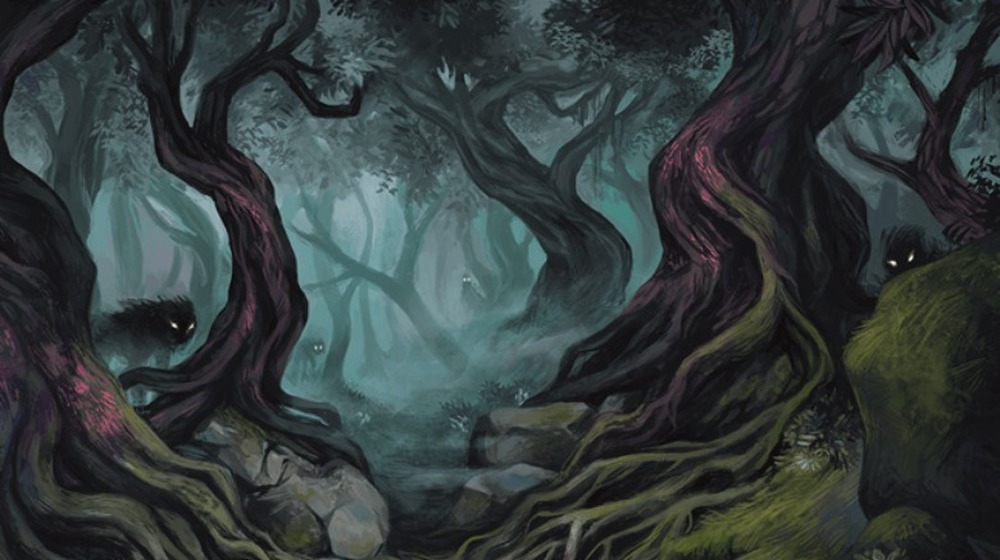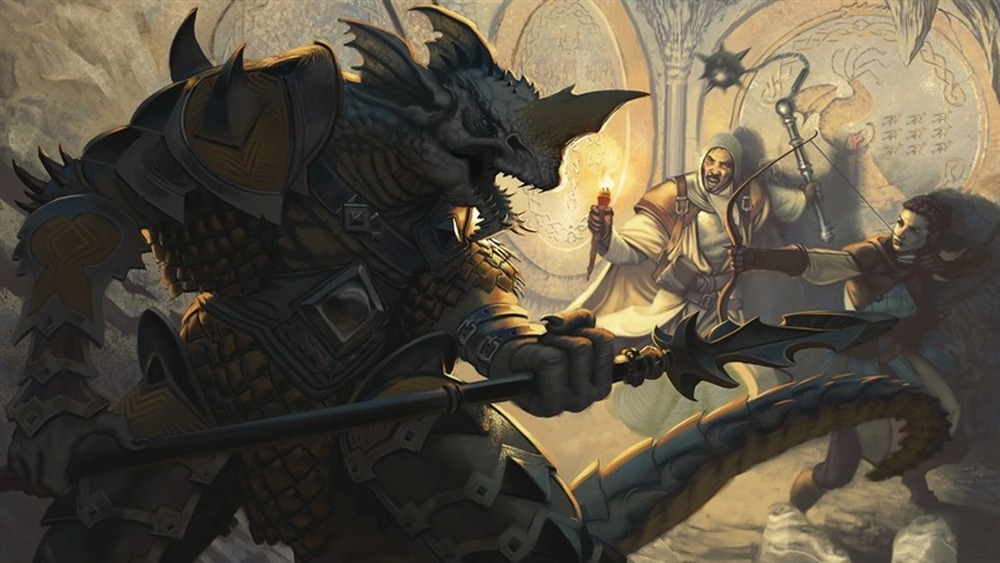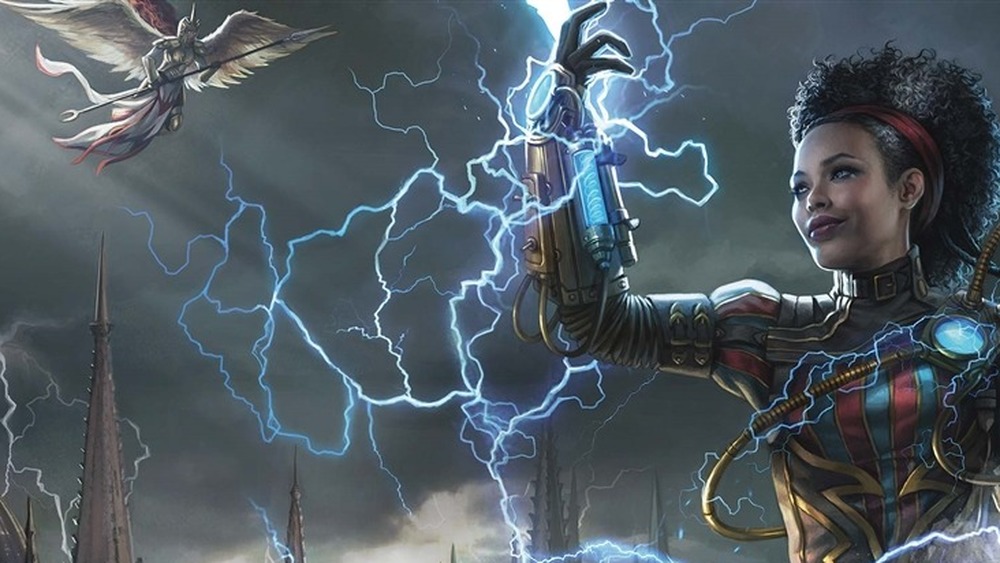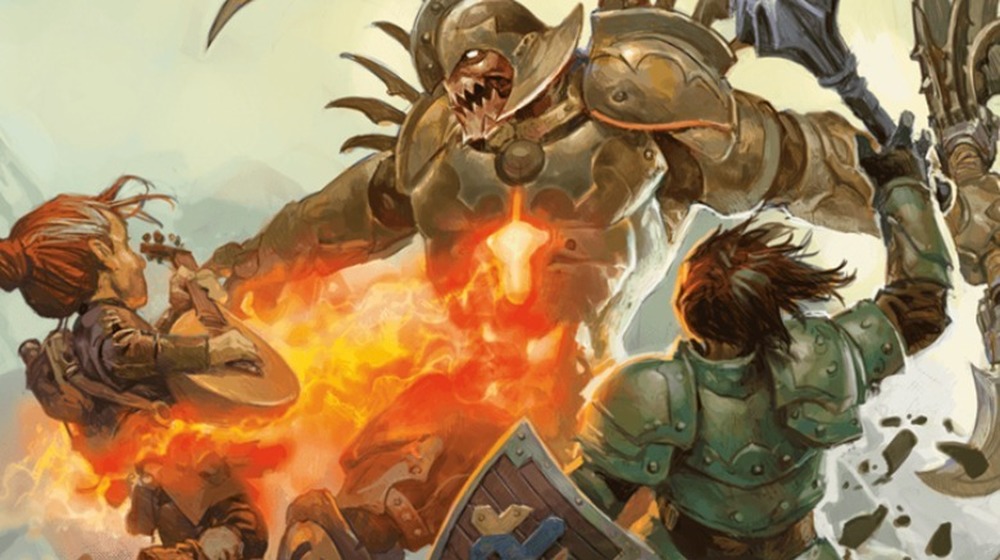The Biggest Dungeons & Dragons Rule Mistakes DMs Should Avoid
Dungeons & Dragons is not difficult to wrap your head around; many of its rules are easy to comprehend, such as how health points and damage resistance work — there's a reason why you should never use Fireball on a red dragon. But because there are so many rules, players can easily forget how several rules work, especially since game sessions are governed by fallible dungeon masters (DMs). Unlike video games based on Dungeons & Dragons, which are controlled by rigid programs that literally cannot forget the rules, glitches notwithstanding, the average DM is a normal, flesh-and-blood human being. Unless they've run a D&D campaign for literally decades, odds are they won't have every rule memorized. Of course, this only applies to DMs worried about playing by the book, specifically the Player's Handbook or Dungeon Master's Guide.
If a DM wants to homebrew up a rule or two to alter the game, they are more than welcome to, but some pre-existing rules are more crucial for a fun experience than others. DMs who mess up the following rules could find their game sessions woefully unbalanced — and worse, not fun.
Bonus Actions
The action economy is the most important aspect of Dungeons & Dragons combat. When players encounter garbage D&D monsters, DMs usually spawn a small army of weaklings because their numerous turns make up for their lack of strength. The reverse is true when players tackle powerful bosses. When both sides are equal, the side with more actions wins, which is why bonus actions are imperative — and often misunderstood. Virtually every class can use a Bonus Action (Player's Handbook, page 189, via Roll20.net), which lets players take a small action to supplement their normal one. Sorcerers with Quickened Spell (Roll20.net), for example, can cast a one-action spell as a Bonus Action. However, DMs should remember players can't use that trick to carpet bomb enemies.
The "Casting a Spell" section (page 202) states players can't cast a Bonus Action spell (via Roll20.net) if they've already cast a non-cantrip spell as an action. But, players can drink a potion and then cast a spell with their Bonus Action since using a potion counts as an action (Dungeon Master's Guide, page 139). Admittedly, the rigidity of these rules depends on the DM. Hosts could stick to the books, or they could enforce house rules that let players ignore them at a cost e.g. cast one non-cantrip as an action and another with a Bonus Action in exchange for one level of Exhaustion. As a DM, the choice is yours.
Darkvision
Players have very limited spell slots and only so much gold to spend on equipment, especially when starting out. So, they might try to be economical and pick a race with Darkvision. Why waste money on torches when you can choose a race that sees in the dark? It's literally in the ability's name! Because that's not how Darkvision works. If you read the description of Darkvision carefully (Player's Handbook, page 183, via Roll20.net), it states players (and monsters) with the ability treat dim light like bright light and darkness as dim light. That isn't splitting hairs. Page 183 also defines dim light as a "lightly obscured" area. Players who need to roll perception checks while lightly obscured do so with disadvantage — they roll dice twice and take the lower result — which is not ideal when you wander a tunnel that might house monsters with Blindsight (also page 183) who aren't hindered by the dark.
If players know they will venture through the Underdark (via Fandom) and try to cheese the campaign with a team of Darkvision races, DMs should remind players that Darkvision is only a band-aid. Without torches — or a spellcaster who knows Light — they are walking into a deathtrap. A grimlock ambush should do the trick.
Surprise
In the battle of Strength vs. Dexterity, Perception wins. Dexterity makes it easier to sneak around unseen, especially when you try to ambush an enemy, but the deciding factor in a surprise attack is Perception, especially since there is no such thing as a Surprise Round. When initiating combat (Player's Handbook, page 189), some players or monsters might get the drop on opponents. As Roll20.net shares, this is known as Surprise, and DMs should remember it is determined on a case-by-case basis. Any creature/player who is potentially surprised weighs their Passive Perception (Wisdom) against their stealthy opponent's Stealth (Dexterity). If Perception forfeits their first turn, they still need to roll initiative to know where that turn lands.
If the ambushing player rolls worse than the ambushee, the surprised opponents are no longer surprised when the stealth initiator's turn rolls around. Sure, the enemies can't take advantage of their good fortune, but they can use Reactions afterwards. That's a waste of a surprise, but it's just how the dice land. Sometimes the only thing more surprising than sneaking up on an enemy is the fact that you actually managed to sneak up on them.
Readying actions and spells
Luck favors the prepared, so players should pack for every eventuality and know when to prepare for battle. During combat, players can transform their action into a preemptive Reaction with Ready (Players Handbook, page 193, via Roll20.net). For example, if an enemy is out of range of a spell, a player can Ready that spell and cast it before their next turn if an enemy moves closer. But, DMs should remind players the risks of preparing actions; even Wizards who practice divination can't always predict the future.
If a player Readies a normal action and specifies a trigger that doesn't happen, they just wasted a turn. But, if that player Readies a spell, they might lose more. Whenever a player casts a spell, they expend a spell slot (cantrips notwithstanding), so if they Ready Fireball and don't cast it before their next turn, the spell fizzles out, as does a valuable third-level spell slot. But that's not all. To Ready a spell, players need to Concentrate (Player's Handbook, page 203) to keep it contained. If they aren't concentrating on another spell, this isn't a problem, but if they're busy maintaining another spell that requires concentration, such as Wall of Fire, they can't keep it going while Readying another spell. You can't conjure your cake and eat it if you are trying to keep a hall on fire.
Opportunity attacks
Not every class is designed for melee combat, which is why many have various escape options when enemies get close. But every so often, a glass cannon finds him or herself within cleaving range of an orc executioner and can't teleport away, so the only course of survival is to take advantage of opportunity attack rules. If they don't, opportunity attack rules will take advantage of them. If for any reason a player needs to bravely run away during combat, they will trigger an adjacent enemy's reaction and give them a free opportunity attack (Player's Handbook, page 195, via Roll20.net). However, DM's can't treat opportunity attacks like a bottomless well of XCOM Overwatch-styled pot shots. Since the ability description states opportunity attacks rely on reactions, players and monsters only get one per round. So, if one player with a high armor class attacks a monster and runs away to trigger its opportunity attack, another adjacent ranged player can slip away scot-free without wasting their action on a Disengage.
Moreover, opportunity attacks only apply when leaving an enemy's immediate vicinity. A player could slip around an enemy's back as long as they stay within arm's reach. This doesn't always provide combat advantages, but when it does, it usually helps them step out of range of an ally's Fireball without risking an opportunity attack.
